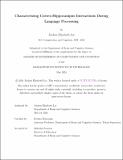Characterizing Cortex-Hippocampus Interactions During Language Processing
Author(s)
Lee, Jiachen Elizabeth
DownloadThesis PDF (4.369Mb)
Advisor
Fedorenko, Evelina
Terms of use
Metadata
Show full item recordAbstract
The role of medial temporal lobe structures, including that of the hippocampus, in language processing, remain largely unknown. In patients with hippocampal damage, language is left largely intact [Vargha-Khadem et al., 1997], suggesting that the hippocampus is likely not necessary for language processing. Recent evidence, however, has shown that the hippocampus may serve functions outside its traditional roles in episodic memory and spatial navigation, and may generally aid in the encoding of relationships across time and space [Cohen and Eichenbaum, 1993]. Hence, the hippocampus may be involved in processes that are also implicated for language processing. Indeed, some patients with hippocampal damage, show deficits in resolving ambiguous discourse referents [Rubin et al., 2011] [Duff et al., 2011], reconstructing narratives [Race et al., 2011a], and display limited linguistic flexibility in engaging "verbal play" [Duff et al., 2009]. Here we leverage a large-scale fMRI dataset (n=790) and identify a region that responds to meaningful language in the anterior portion of the left hippocampus. We then characterize its response profile and show that it is responsive to semantically meaningful material but is not engaged during cognitively demanding spatial working memory and arithmetic tasks. Next, we examine the relationship between hippocampal and cortical language processing, starting with the neural correlates of word- and sentence- memorability in both the hippocampal and cortical language areas. Lastly, we leverage an encoding-model-guided procedure to search through a large set of sentences to identify those that are predicted to maximally differentiate responses in the cortical and hippocampal language areas. We find that cortical language areas are largely driven by surprisal, while hippocampal language areas display preferences towards more imageable and concrete sentences.
Date issued
2024-05Department
Massachusetts Institute of Technology. Department of Brain and Cognitive SciencesPublisher
Massachusetts Institute of Technology